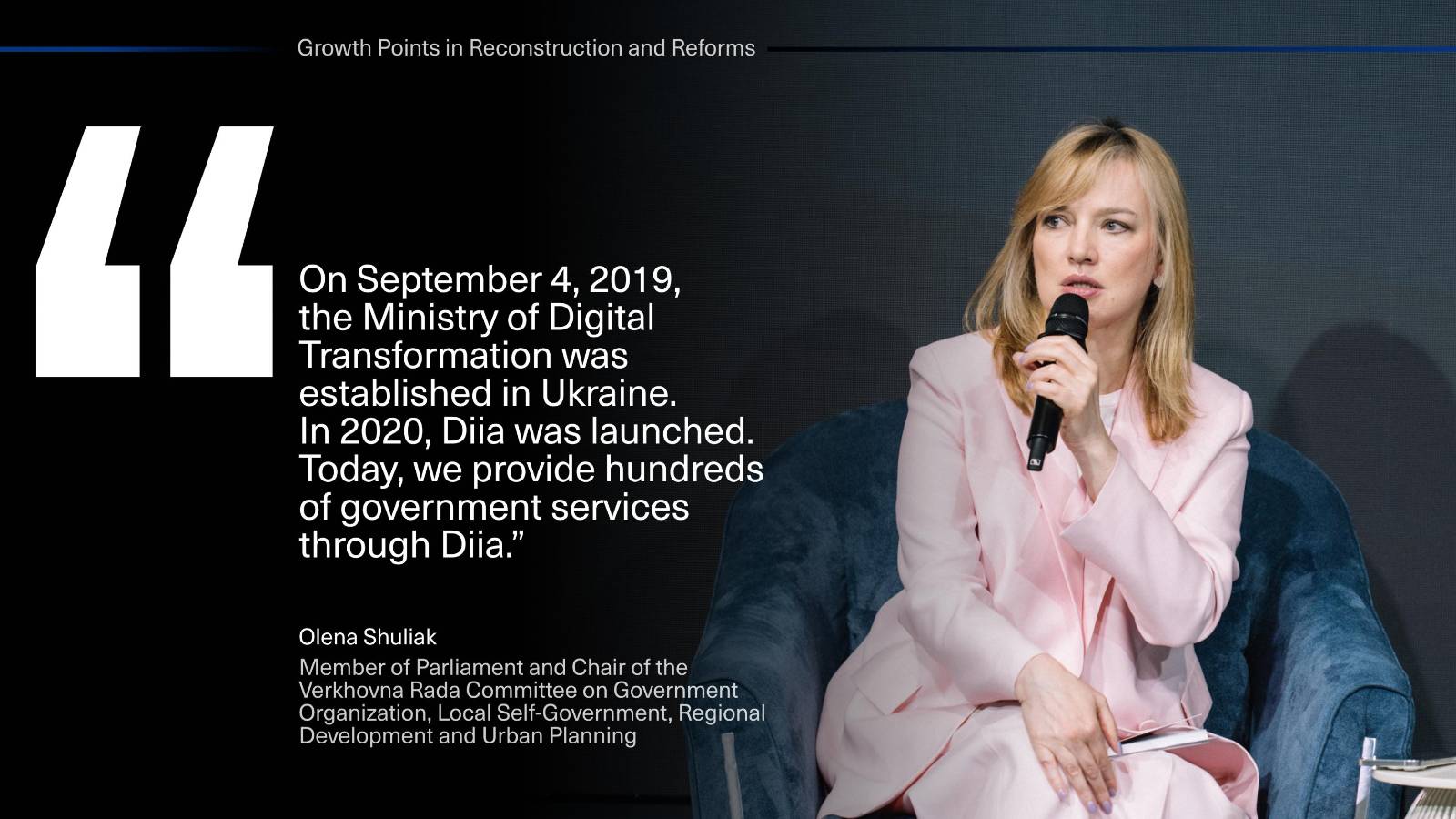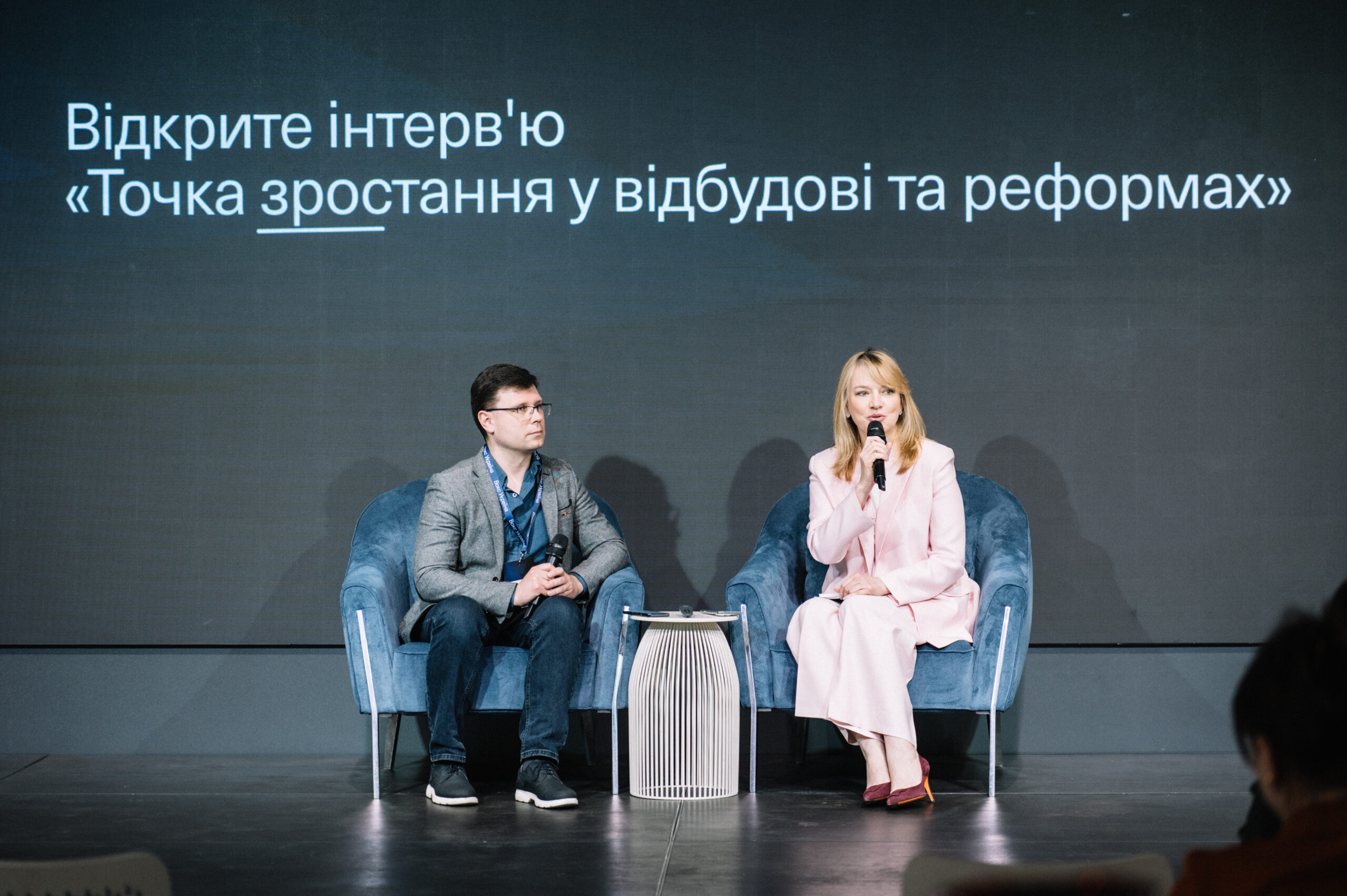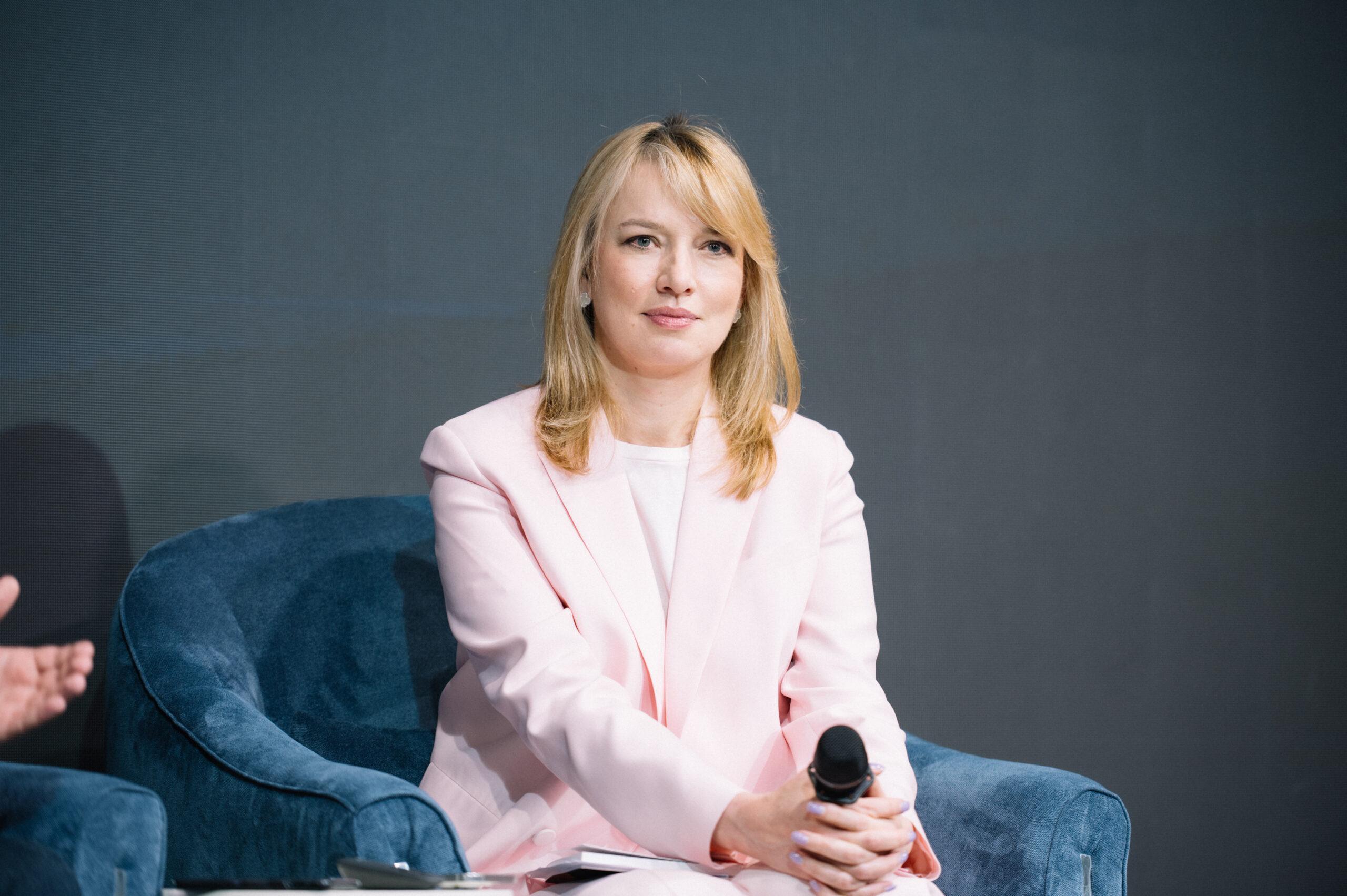At the conference “EU. BUT THERE’S ONE TWIST,” organized by Vox Ukraine, Olena Shuliak, Member of Parliament and Chair of the Verkhovna Rada Committee on Government Organization, Local Self-Government, Regional Development and Urban Planning, spoke about Ukraine’s achievements, challenges, and lessons.
In an open interview with Yurii Tabachenko, she outlined the main growth points — from anti-corruption infrastructure to the “eRecovery” program, which has already reached over 100,000 Ukrainians.
We thank Anastasia Sosnova, Communications Manager at Vox Ukraine, for preparing this article based on Olena Shuliak’s speech.
The event was organized by Vox Ukraine with the support of the National Endowment for Democracy (NED) on May 23, 2025. Watch the conference recording here.
Top 3 reform successes: anti-corruption, digitalization, land reform
Among the key achievements, Olena Shuliak highlighted the launch and functioning of anti-corruption infrastructure (NABU, SAPO, HACC), digital transformation (Diia), and the opening of the land market.
On anti-corruption reform
“I am very proud that it was during our parliamentary term that the entire anti-corruption infrastructure was established. Today, not only NABU is operational, but also SAPO, HACC, all the anti-corruption institutions — a foundation has been built to help the country develop honestly, transparently, and punish those who violate anti-corruption legislation.”
Olena Shuliak noted that despite the established infrastructure, challenges remain.
“Unfortunately, every day we see journalistic investigations, scandals involving various people at the local or central government level. This is the challenge we all must overcome together. But there is very good news — no one is exempt from the law, as we can see over the past years. If the law is broken, the anti-corruption infrastructure protects no one, and it does not classify anyone as untouchable. This is a perfect sign and a big plus for Ukraine’s European integration.”
On digitalization
“On September 4, 2019, the Ministry of Digital Transformation was established in Ukraine. In 2020, Diia was launched. Today, we provide hundreds of government services through Diia, including complex services such as, for example, ‘eRecovery’. Hundreds of thousands of people have already used it — without corruption, without meetings with officials, without queues. This is all thanks to our government officials working in this field, our experts, and international partners who have supported the digitalization reform for a long time. Today, Ukraine is among the top 5 countries in the world that can export their digitalization experience.”

On land reform
“I am very proud of the land reform. Its adoption took place before my eyes despite all the ‘amendment spam’, when for months we stood at the tribune reading amendments so that the bill would finally be adopted. Unfortunately, the full-scale invasion did not allow us to reap all the benefits of this reform, but I am confident that the war will end, there will be victory, peace will come, and the foundation laid by the land reform legislation will have a positive economic effect.”
Three main challenges still to be overcome: pension reform, customs reform, and decentralization
Olena Shuliak identified pension reform and customs reform as challenges still to be tackled. She acknowledged that the current pension system cannot cope with the burden, as there are too few workers compared to pensioners. Other pressing issues include customs reform and a reboot of the Economic Security Bureau. She described decentralization reform as both an achievement and “a job still to be done.”
On pension reform
“Pension reform hasn’t succeeded yet. Ukraine now faces major challenges. The same challenges exist in the European Union. The current system will not be able to provide decent pensions to our pensioners. Pension reform is a challenge. I don’t know how quickly we’ll be able to overcome this challenge, but it is something that not only parliamentarians will have to work on.”
On customs reform
“At every meeting with businesses, we get questions about customs reform, reloading of the Economic Security Bureau, blocking tax invoices etc. This is the challenge we will have to deal with.”
On decentralization
“Of course, the direction of the reform chosen back in 2014, when powers, resources, funds, as well as land and property, were transferred to local levels, was the right one. Thanks to this, communities gained enormous influence over how to manage their assets and resources. But I would like to remind everyone that the decentralization reform first of all aimed to ensure that citizens receive quality services at the local level. Whether local services are of high quality is a big question. There are questions about educational and medical services, the work of administrative service centers, etc. There are also questions about local-level decision-making and communication between community leaders and residents.”

“Since 2020, there has been an intense debate in parliament about introducing oversight over the decisions made by local self-government bodies. At the same time, it feels like the discussion hasn’t developed since 2018. So the issue of accountability, which must go hand-in-hand with powers and resources, is still unresolved.”
“The good news is that the issue of oversight of the legality of local government decisions is included in the Ukraine Facility plan and in the EU Enlargement Report, so Ukraine will definitely adopt the relevant legislation. But I’d like to see more action and fewer conversations, because speed matters. The astonishing speed with which we obtained EU candidate status proves that we can move at lightning speed. Apparently no other EU candidate country has moved toward membership under such conditions, with such speed and intensity.”
The path to the EU is not only about adopting legislation but also about exchange of experiences
Moderator Yurii Tabachenko noted that in many areas, the Ukrainian experience is already starting to surpass EU practices. For example, banking services, digital documents, and online access to services in Ukraine are often more convenient than in some EU member states.
On digitalization as an export product
“When we tell our European colleagues that in the first month of the full-scale invasion we already began developing the ‘eRecovery’ program and explain how it works, our European colleagues suggest adopting this experience not only for the European Union but also for worldwide use, for example, in places where natural disasters occur. Because Ukraine’s experience in rapid response, information gathering, and compensation provision is unique.”
However, in the legislative field, Ukraine currently adopts more of the EU norms than vice versa. And in some areas, such as the implementation of the industrial visa-free regime, progress is slower than expected.
On the industrial visa-free regime
“We are doing a lot in this direction, but we are moving slower than we would like to. Not all products manufactured in Ukraine today meet the standards of the European Union. It is important to understand that some of our producers will not be able to operate under full EU membership if they do not make certain investments in modernizing their production now. These investments are not just expenses, they create opportunities to enter the EU market.”
Reconstruction: Ukraine’s experience is unique
Shuliak emphasized that Ukraine is not simply adopting European standards, but is already forming its own standards, especially regarding safety, energy efficiency, and inclusivity.
On safety, the experience of other countries, and how we can be helpful
“In 2022, when we started working on this issue, we thought: ‘Let’s take Israel’s experience — mamad rooms (bomb shelters – ed.), etc.’ But we soon realized that the kind of weapons used against Israel are not the same as those Russia is using against us. Unfortunately, missiles make buildings collapse like dominoes. So, the experience of Finland or Switzerland suits us better. In any case, safety will be the foundation of future reconstruction. We have already reviewed construction codes and will continue this work, as well as share our experience in civil protection with Europe.”

On energy efficiency
“Energy independence is the area where we adopt practices, legislation, and standards from the European Union. We can no longer afford to build energy-inefficient buildings, to ‘heat the air’ as we sometimes did before the full-scale invasion. Technologies related to green, environmentally conscious reconstruction, with high energy efficiency, will be the foundation of our recovery. First and foremost, it is necessary to implement European standards in this area.”
On accessibility
“Today, the national governmental strategy for accessibility is in place. The first solutions are being implemented in pilot cities. But this is not enough. We will need to quickly revise our approaches and make both workplaces and government institutions (for example, centres for administrative services provision) accessible.”
On the “eRecovery” program and the scale of destruction
“In March 2022, the Ministry of Digital Transformation enabled every citizen whose housing was damaged or destroyed to log into Diia and report the damage or destruction to the state. This was necessary to develop a general compensation mechanism and, of course, to plan how much funding is needed and where it should be directed first.
Currently, nearly 850,000 such reports about more than 60 million square meters have been registered in the system. Since before the full-scale invasion, we built about 10 million square meters per year, Russia has destroyed in three years of full-scale invasion what we had built in at least six years. This data is not final, as much of the housing remains in temporarily occupied territories.”
“As of now, within the framework of ‘eRecovery’, over 100,000 citizens have received compensation totaling UAH 27 billion. Funds were provided by our two major partners: the World Bank, which provided over $200 million in 2023 and signed an $84 million agreement this year, and the Council of Europe Development Bank, which has been providing us with €100 million for the second consecutive year.
However, this is not enough. That’s why in 2022 we confiscated UAH 17 billion from the Russian Sberbank, which operated in Ukraine, and directed them to the Fund for Liquidation of the Consequences of Armed Aggression, and then to financing compensations for damaged or destroyed housing. In my opinion, this is fair. Similarly, frozen Russian assets and the revenues from them, as well as everything confiscated from the aggressor state, should be used to compensate for damaged houses of Ukrainians.”
Photo: Kate Lashchykova
Attention
The author doesn`t work for, consult to, own shares in or receive funding from any company or organization that would benefit from this article, and have no relevant affiliations



